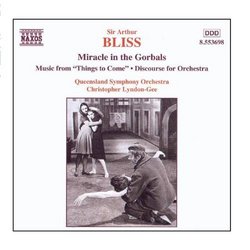Variations on a Blissian Theme
Thomas F. Bertonneau | Oswego, NY United States | 10/04/2000
(4 out of 5 stars)
"British composers seem particularly attracted to the variations-on-a-theme pattern. Think of Elgar, with his Enigma Variations, of Delius with his Brigg Fair, of Britten with his Variations and Fugue on a Theme of Purcell, or even of Vaughan-Williams with his Tallis Fantasia, in fact a set of variations on a sixteenth-century hymn-tune. A good portion of the work of Sir Arthur Bliss (1891-1975) adheres to the variation principle: There is the Introduction and Allegro for Orchestra (1922), the one-movement Concerto for Two Pianos and Orchestra (1925), the Meditations on a Theme of John Blow (1955), the Discourse for Orchestra (1957), and the Metamorphic Variations for Orchestra (1972). The variation principle is also important, for Bliss, in his ballets, where musical character-development is often achieved by this method. This Naxos disc contains the first modern recording of the Discourse for Orchestra (in its revision of 1965) as well as the first complete recording (so the notes say) of the ballet music for "Miracle in the Gorbals" (1944). Snatches from Bliss' score for the Wells-Korda film "Things to Come" fill out the program. Bliss couches the Discourse in the terse, motivically based, language which, while perfectly tonal, nevertheless represents his concession to modernity. The theme is based on a few falling intervals heard initially in the woodwinds; development begins immediately, and although there are six distinguishable sections the music moves forward continuously with much overlapping from one section to the next. Listeners will identify the usual Bliss fingerprints - the pounding rhythmic ostinati over which string-melodies broadly unfurl, the martial intrusions of the brass, the passages of dense but exciting counterpoint. The ballet, by contrast, is almost uniformly dark in color; the story that it tells is a tragic one, involving a Dostoyevskian reappearance of Christ in a modern slum setting. Although the "Stranger" resurrects a girl-suicide, the people suspect him and eventually lynch him in an awful mob-scene. The central episode of the "Stranger's" first manifestation is, naturally, a set of variations. It is a pity that more extensive excerpts from "Things to Come" could not be conjured forth for this production; this magnificent music - just maybe the best film-score ever - has yet to receive its full due on CD. The bits that we do hear, "reconstructed by [the late] Christopher Palmer," are quite brief; most of the engaging "machine ballet" from the reconstruction-of-the-world sequence is omitted, nor does the important choral part appear in the Elgarian "Epilogue." John Mauceri does better on one of his film-music anthologies, although his version is marred by distracting acoustic special-effects. For the Discourse and "Miracle in the Gorbals," this CD gets four stars."
Rarely heard music from Great Britain
F. Behrens | Keene, NH USA | 09/26/1999
(4 out of 5 stars)
"Sir Arthur Bliss is also given a trilogy on 8.553698: Discourse for Orchestra (revised version), Miracle in the Gorbals (complete ballet score), and Music from "Things to Come." None of these versions have ever been recorded before and these scores are very interesting. The ballet and film scores, however, are in a sort of artistic limbo since the music makes little sense without your knowing what visuals are attached to it, so to speak. Although we are told the scenario of each movement of "Miracle," the music does not stand as much on its own as do ballet scores by Tchaikovsky and Stravinsky. For collectors of the rare. Christopher Lyndon-Gee conducts the Queensland Symphony Orchestra."


 Track Listings (29) - Disc #1
Track Listings (29) - Disc #1